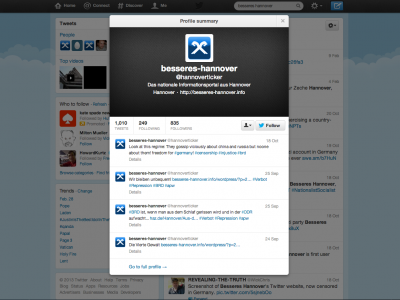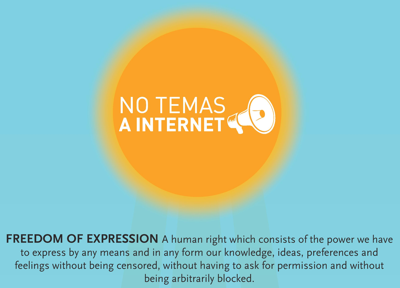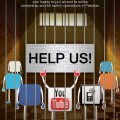Stories about Free Expression from February, 2013
Germany: Twitter's First Local Blocking Case
Last October, Twitter announced that it would block the account of a neo-Nazi group in Germany, the activities of which had been banned by the German government. The case represented Twitter's first use of the policy, which typically protects online expression to a broad extent, except in cases where governments intervene.
“Don’t Fear the Internet”: Exceptions to Copyright in Chile
With this new video from the #NoTemasaInternet (Don't fear the Internet) campaign, NGO Derechos Digitales shows the exceptions to copyright they have in Chile. They also want to encourage us to use them without fear. It’s our right!
Zambia: Chinese Experts to Monitor Internet?
The Zambian government has reportedly engaged Chinese experts to install a secret internet monitoring facility in the country. Information technology specialists from both the Office of the President and China are visiting communications service provider facilities to study their network architecture, in order to identify places in the network where authorities could develop interception capabilities, or a "backdoor" for monitoring. Both Zambian and Chinese authorities have declined to comment on reports about their cooperation.
Pakistan: The “Access Is My Right” Campaign
Pakistani Internet rights NGO Bytesforall has started an online campaign about internet filtering and online censorship. Using storytelling, infographics, and more, the "Access Is My Right" campaign aims to raise Internet users' awareness about policies and practices that limit the right to free expression online.
Insult or Injury? Exploring Online Defamation
In many countries, the line between the right to free expression and a person's right to protect his or her reputation is a blurry one. In the Internet age, the issue has become even more complex. The Internet has created infinite new opportunities for individuals to express their own opinions, but this does not come without limits. One way in which online speech is commonly curtailed is through laws against defamation.
China: Bloggers “Forced to Drink Tea” with Police
Tea-drinking culture has a very long tradition in China. However, since around 2007, Chinese netizens have started using the term "tea talk" or "forced to drink tea" (被喝茶) to describe interrogations by the internal security police. Online opinion leaders, people who write about or host online platforms for political dissent, and signatories of online petitions are all frequently "forced to drink tea" with police and asked to give up sensitive information about their political activities. This post includes tips from online opinion leader Wu Gan on how to approach a tea talk with police.
[Video] “Don’t Fear the Internet”: Wikipedia, Copyright, and Free Expression Online
In this video interview from the #NotemasaInternet (Don’t fear the Internet) campaign on online copyright, we talked to Osmar Valdebenito of Wikimedia, a foundation that coordinates and makes the infrastructure of Wikipedia possible worldwide.
Egypt: Court Orders YouTube Ban
On Saturday, February 9, an administrative court ordered a 30-day ban on YouTube and all websites linking to an anti-Islam film, "The Innocence of Muslims". The movie sparked turmoil in the Middle East when it was first published last year. The ruling may not be enforced immediately and it is likely to be appealed.
Imgur.com blocked in Azerbaijan?
Popular image-sharing site Imgur.com appears to be blocked in Azerbaijan. There is little evidence that Imgur is popular in Azerbaijan. But a few weeks ago, when hacker group Anonymous released a huge volume of documents leaked from Special State Protection Service of Azerbaijan, a user went through the materials and posted some of the more interesting documents available on Imgur.com. This post details a user's technical investigation of the blocking.
It's Time for Transparency Reports to Become the New Normal
Surveillance is a growth industry: every existing report shows that the number of government requests for user data is rising, and this trend shows no sign of abating. Transparency reports are essential to helping users understand the scope of Internet surveillance and make informed decisions about storing their sensitive data or engaging in private communications. Companies should not wait until their users are clamoring for clarification. It is time for transparency reports to become the new normal.










